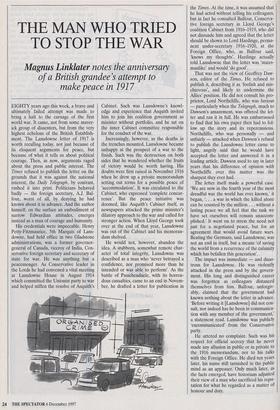THE MAN WHO TRIED TO STOP THE WAR
Magnus Linklater notes the anniversary
of a British grandee's attempt to make peace in 1917
EIGHTY years ago this week, a brave and ultimately failed attempt was made to bring a halt to the carnage of the first world war. It came, not from some maver- ick group of dissenters, but from the very highest echelons of the British Establish- ment. The Lansdowne letter of 1917 is worth recalling today, not just because of its eloquent arguments for peace, but because of what it tells us about political courage. Then, as now, arguments raged about the press and public interest. The Times refused to publish the letter on the grounds that it was against the national interest; the Daily Telegraph, by contrast, rushed it into print. Politicians behaved badly — the foreign secretary, Bal- four, worst of all, by denying he had known about it in advance. And the author himself, on the surface an embodiment of narrow Edwardian attitudes, emerges instead as a man of courage and humanity.
His credentials were impeccable. Henry Petty-Fitzmaurice, 5th Marquis of Lans- downe, had held office in two Gladstone administrations, was a former governor- general of Canada, viceroy of India, Con- servative foreign secretary and secretary of state for war. He was anything but a peacemonger. As Conservative leader in the Lords he had convened a vital meeting at Lansdowne House in August 1914 which committed the Unionist party to war and helped stiffen the resolve of Asquith's Cabinet. Such was Lansdowne's knowl- edge and experience that Asquith invited him to join his coalition government as minister without portfolio, and he sat on the inner Cabinet committee responsible for the conduct of the war.
Increasingly, however, as the deaths in the trenches mounted, Lansdowne became unhappy at the prospect of a war to the finish. Such was the destruction on both sides that he wondered whether the fruits of victory would be worth having. His doubts were first raised in November 1916 when he drew up a private memorandum setting out terms for a possible peace of `accommodation'. It was circulated to the Cabinet, who expressed 'complete concur- rence'. But the peace initiative was doomed, like Asquith's Cabinet itself, as newspapers attacked the prime minister's dilatory approach to the war and called for stronger action. When Lloyd George took over at the end of that year, Lansdowne was out of the Cabinet and his memoran- dum shelved.
He would not, however, abandon the idea. A stubborn, somewhat remote char- acter of total integrity, Lansdowne was described as a man who 'never betrayed a confidence, nor promised more than he intended or was able to perform'. As the battle of Passchendaele, with its horren- dous casualties, came to an end in Novem- ber, he drafted a letter for publication in the Times. At the time, it was assumed that he had acted without telling his colleagues, but in fact he consulted Balfour, Conserva- tive foreign secretary in Lloyd George's coalition Cabinet from 1916-1919, who did not dissuade him and agreed that the letter should be shown to Lord Hardinge, perma- nent under-secretary 1916-1920, at the Foreign Office, who, as Balfour said, `knows my thoughts'. Hardinge actually told Lansdowne that the letter was 'states- manlike' and would 'do good'.
That was not the view of Geoffrey Daw- son, editor of the Times. He refused to publish it, describing it as 'foolish and mis- chievous', and likely to undermine the Allies' position. He did not consult his pro- prietor, Lord Northcliffe, who was furious — particularly when the Telegraph, much to Dawson's amazement, was offered the let- ter and ran it in full. He was embarrassed to find that his own paper then had to fol- low up the story and its repercussions. Northcliffe, who was personally — and unfairly — attacked when Dawson's refusal to publish the Lansdowne letter came to light, angrily said that he would have accepted the letter and answered it in a leading article. Dawson used to say in later years that his difference of opinion with Northcliffe over this matter was the sharpest they ever had.
The letter itself made a powerful case. `We are now in the fourth year of the most dreadful war the world has ever known,' it began, `. . . a war in which the killed alone can be counted by the million . . . without a lasting peace we all feel that the task we have set ourselves will remain unaccom- plished.' It went on to stress the need not just for a negotiated peace, but for an agreement that would avoid future wars. Beating the Germans, said Lansdowne, was not an end in itself, but a means 'of saving the world from a recurrence of the calamity which has befallen this generation'.
The impact was immediate — and disas- trous for Lansdowne. He was violently attacked in the press and by the govern- ment. His long and distinguished career was forgotten as colleagues distanced themselves from him. Balfour, unforgiv- ably, claimed that the government had known nothing about the letter in advance. `Before writing it [Lansdowne] did not con- sult, nor indeed has he been in communica- tion with any member of the government,' a statement read. Lansdowne was publicly `excommunicated' from the Conservative party. He uttered no complaint. Such was his respect for official secrecy that he never made any allusion in public or in private to the 1916 memorandum, nor to his talks with the Foreign Office. He died ten years later, his name still tarnished in the public mind as an appeaser. Only much later, as the facts emerged, have historians adjusted their view of a man who sacrificed his repu- tation for what he regarded as a matter of honour and duty.


















































































 Previous page
Previous page